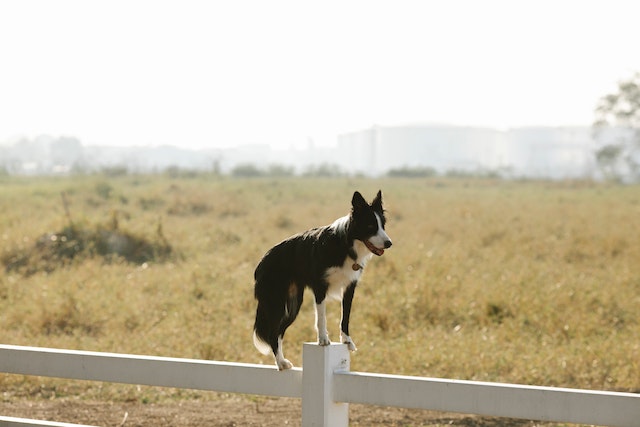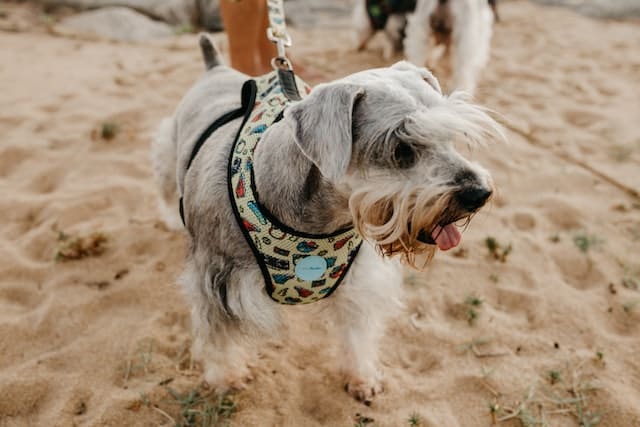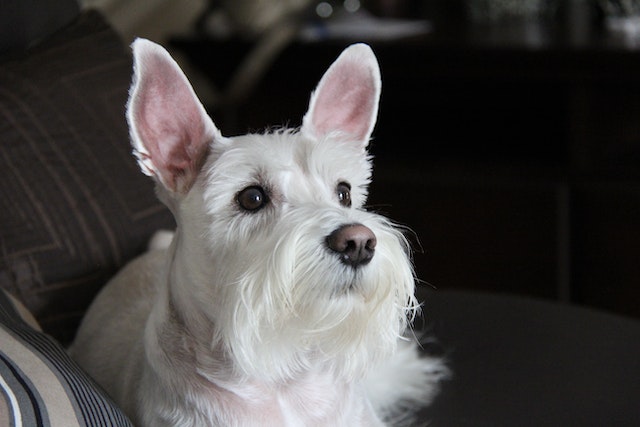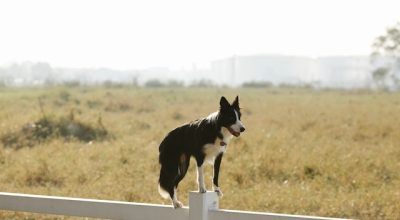If you’re having trouble deciding between a Miniature Schnauzer and a Border Collie, this article can help. Both kinds are widely sought after by dog owners, and we will discuss their distinct traits, temperaments, and other qualities to help you decide which breed best meets your needs and preferences.
We hope that by offering an in-depth analysis of these breeds, we can help you make the best decision for your lifestyle and home. We will highlight crucial points to consider when selecting your new furry buddy, whether you choose a smaller, low-maintenance companion like the Miniature Schnauzer or the active and smart Border Collie.
Characteristics Comparison for Miniature Schnauzer and Border Collie
The Miniature Schnauzer is a compact canine breed recognized for its cleverness, fondness, and outgoing nature. They are loyal to their families and require a lot of attention. On the other hand, the Border Collie is a medium-sized dog breed that is also known for its intelligence, loyalty, and hardworking nature. If you think that’s all that Border Collies and Miniature Schnauzers have to offer, you’re wrong because there’s more than meets the eye.
| Breed/Characteristics | Temperament | Activity Level | Compatibility |
|---|---|---|---|
| Border Collie | Border Collies thrive when given tasks and require mental and physical stimulation. They are responsive to their owner's commands and have a sensitive nature. | Border Collies are highly energetic, acrobatic, and athletic dogs. | Border Collies are affectionate and loyal to their families. They are good with children and other pets if they are socialized properly. |
| Miniature Schnauzers | Miniature Schnauzers enjoy being with their families and are known for their affectionate nature. | Miniature Schnauzers are adaptable to apartment living yet possess tireless energy and enjoy vigorous play. Their hardy and feisty nature stems from the Standard Schnauzer. | Miniature Schnauzers are compatible with other animals and children. They are family-oriented and make great companions. |
Breed History

The Border Collie is a dog breed originally bred to work with sheep and other herd animals. The breed originates in England and Scotland’s lowland and border counties, possibly dating back to the 1700s. Over centuries, the breed was carefully developed for its exceptional herding abilities, playing a crucial role in managing large sheep flocks.
Although the formal recognition of the Border Collie breed occurred in the late 1800s, herding dogs, Collies, and shepherd dogs have existed in Scotland for thousands of years. As the Border Collie gained recognition and popularity, it was exported from Great Britain to sheep farms and ranches worldwide, where obedience exhibitors later discovered them. The Border Collie Society of America was established as an organization dedicated to preserving the breed’s herding instinct and educating judges about the breed’s unique qualities.
Miniature Schnauzer is a small dog. They originated in Germany in the mid-to-late 19th century. Its purpose mainly focused on herding, guarding, and general-purpose dog for German family farms. The first Miniature Schnauzer record is from 1888 and describes a black female called Findel.
Appearance of a Miniature Schnauzer and a Border Collie
The Miniature Schnauzer boasts a unique square-shaped physique, highlighted by a rectangular head and a blunt muzzle. This breed is recognizable by its black nose, with the head width tapering slightly from the eyes to the ears. Their coat is a double layer comprising coarse outer fur and a gentle undercoat.
Notably, they have bushy eyebrows, a mustache, and a beard that enhance the rectangular shape of their head. Their legs are adorned with long hair that hangs straight and nearly reaches the ground.
The Border Collie is a dog breed famous for its balanced and robust body structure. They possess a strong and agile body, characterized by a lean frame and a slightly elongated body in relation to their height.
The coat of a Border Collie can either be smooth and short or rough and medium-length, often accompanied by feathering. Positioned high on their heads, their ears stand alert, while their long and bushy tail constantly wags. One of their most notable features is their intense gaze, called the “eye,” which they employ to command and manage their flock.
Size Comparison
The Border Collie is a medium-sized breed, with an average height ranging from 18 in. to 22 in. at the shoulder. They typically weigh between 30lbs and 55lbs, with males slightly larger than females. Male Border Collies usually weigh 40lbs to 45lbs and stand 19 in. to 22 in. tall. In comparison, females weigh approximately 27lbs to 42lbs and have a height of 18 in. to 21 in.
On the other hand, the Miniature Schnauzer is a small breed, measuring about 12 to 14 inches at the shoulder. Both male and female Miniature Schnauzers generally weigh between 10 to 20 pounds.
Coats & Colors
Border Collies display various coat colors, including black and white, blue, blue merle, and sable. It’s worth noting that white Border Collies are rare and may have an increased risk of health issues. Red Border Collies come in different shades of red, while red merle Border Collies features a red base coat with white markings and dark patches. Gold Border Collies resemble Golden Retrievers in their coloration.
Miniature Schnauzers, on the other hand, have three recognized colors:
- Salt and pepper
- Black and silver
- Solid black
Variations such as gray, light silver, black, and wheaten can also occur. Wheaten Miniature Schnauzers possess a reddish, banded coat with light roots and a dark tip. The rarest colors among Miniature Schnauzers include wheaten, blue, and rust. Wheaten Miniature Schnauzers also exhibit specific eye colors, paw pads, and nose colors.
Personality & Temperament Difference

Border Collies are energetic, intelligent, diligent dogs that flourish when provided with mental and physical challenges. They have strong herding instincts and require proper socialization to prevent fearfulness. Miniature Schnauzers are small but energetic dogs with a friendly and sociable nature. They can be mischievous and stubborn but are also loyal and affectionate towards their family. Both breeds require early training to establish boundaries and ensure a well-balanced temperament.
Dogs towards Family
Border Collies are an ideal fit for active families due to their energetic nature and enthusiasm for physical activity. With their exceptional intelligence, they excel in various dog sports and working roles. These devoted and dependable companions thrive when they receive mental and physical stimulation. However, it’s important to note that Border Collies possess a strong herding instinct, which may lead them to attempt herding young children and other pets if not properly trained from an early age.
On the other hand, Miniature Schnauzers make lovely family dogs. Still, there are a few factors to consider before welcoming one into your home. Known for their intelligence and trainability, they are an excellent choice for first-time dog owners. Miniature Schnauzers quickly adapt to different living environments, thriving in urban and rural settings.
Kids
Border Collies are an ideal fit for active families due to their energetic nature and enthusiasm for physical activity. With their exceptional intelligence, they excel in various dog sports and working roles. These devoted and dependable companions thrive when they receive mental and physical stimulation. However, it’s important to note that Border Collies possess a strong herding instinct, which may lead them to attempt herding young children and other pets if not properly trained from an early age.
On the other hand, Miniature Schnauzers make lovely family dogs, but there are a few factors to consider before welcoming one into your home. Known for their intelligence and trainability, they are an excellent choice for first-time dog owners. Miniature Schnauzers quickly adapt to different living environments, thriving in urban and rural settings.
Other People
Introducing your Border Collie or Miniature Schnauzer to new people requires a gentle and careful approach. The key is to create positive experiences by offering treats and ensuring your puppy feels happy and comfortable around strangers. Early socialization is crucial, starting from the day your puppy comes home. Familiarize them with the household environment and gradually introduce them to family members, allowing for gentle playtime. Let visitors meet and interact with your new puppy is also beneficial.
Patience and consistency are essential throughout the process. By understanding your dog’s behavior, you can anticipate and address any potential issues calmly and promptly. Having realistic expectations and maintaining a patient, firm, and consistent approach is essential, which you can achieve using positive reinforcement techniques.
Before bringing your new dog home, it’s essential to prepare your home for its arrival. Tidy away your existing pets’ toys, provide separate bowls for your new dog and create separate spaces where each animal can have their own space to retreat to.
Dogs & Other Animals
Border Collies are friendly and gentle, making them well-suited to get along with other animals, including cats and dogs. However, it is vital to introduce them properly and establish boundaries for both sides of the friendship. Border Collies have a natural chasing instinct, so training is necessary to teach them to see cats as part of the pack rather than prey.
Similarly, Miniature Schnauzers can have positive relationships with other dogs, mainly if you socialize them from a young age. They generally get along with other family pets, including cats, but may playfully chase them. However, they may display more assertiveness toward unfamiliar dogs of the same sex.
It is important to note that Miniature Schnauzers may have a natural prey instinct toward small animals like cats, and birds. Gradual and consistent introductions to other animals can help establish a sense of equality within the family. Supervision is vital, especially when interacting with smaller animals.
Proper training, socialization, and supervision are crucial to fostering positive relationships between Border Collies, Miniature Schnauzers, and other animals. Each dog is unique, so it is essential to consider their personalities and needs when introducing them to other pets.
Behaviour Issues
Unwanted dog behaviors can present challenges for owners, but effective strategies exist to manage and address them. Training plays a vital role in preventing and redirecting unwanted behaviors. Teaching basic commands like sit, come, and lie down can help establish boundaries and promote positive behavior. Obedience training addresses specific behaviors and strengthens the bond between you and your dog.
Prevention is critical in managing unwanted behaviors. Puppy-proofing your house, keeping tempting items out of reach, and providing supervision can help avoid developing bad habits. It is easier to prevent unwanted behaviors from forming than to correct them later.
Rewarding desired behaviors is crucial in shaping your dog’s behavior. Positive reinforcement helps reinforce good habits and encourages your dog to repeat those behaviors, such as giving treats, offering praise, or showing affection.
- Barking – while Border Collies and Miniature Schnauzers may have different personalities, they may share common behavior problems like excessive barking. By understanding its cause, you will know how to address it directly.
- Separation Anxiety – separation anxiety, a typical dog issue, can be managed through dedicated training, behavior modification techniques, and gradual desensitization exercises. Vets recommended medication in a more serious cases.
- Aggression – aggressive tendencies in dogs can be addressed through positive reinforcement training, rewarding good behavior, and seeking professional guidance. Consulting with your veterinarian is crucial if your dog exhibits aggressive tendencies.
By implementing these strategies and seeking appropriate guidance, dog owners can effectively manage and address unwanted behaviors, promoting a harmonious and fulfilling relationship with their canine companions.
Training & Exercise Comparison between Miniature Schnauzer and Border Collie
Regular exercise is crucial for Miniature Schnauzers and Border Collies to maintain good physical and mental health. It helps prevent obesity, promotes muscle development, and provides an outlet for their energy.
For Miniature Schnauzers, exercise can also minimize the risk of health complications and prevent behavioral issues. Ideas for exercising Miniature Schnauzers include:
- Teaching new tricks
- Playing interactive games
- Engaging in agility training
Border Collies benefit from short training sessions, incorporating training into playtime, agility training, and long walks or hikes. Interactive play is also vital for mental stimulation in both breeds.
Taking Care & Maintenance

Taking care of a Miniature Schnauzer and Border Collie include providing proper diet, exercise, grooming, and regular veterinary care. Addressing these aspects of care ensures the overall well-being and happiness of your pet whichever the breed you choose.
| Border Collie | Miniature Schnauzer | |
|---|---|---|
| Diet & Exercise | Border Collies are highly energetic dogs that require ample exercise. Provide daily physical activity, such as walks, runs, or engaging in dog sports, to keep them mentally and physically stimulated. | Ensure your dog receives a balanced diet and monitor their food intake. Regular exercise is crucial for their overall health and well-being. |
| Grooming | To prevent tangling and eliminate loose hair, it is recommended to brush their fur regularly. It is also important to keep an eye on their nails and trim them as necessary. | Brush your Miniature Schnauzer's coat as needed, ideally at least once a week. Professional grooming twice a year can help maintain their wiry double coat. |
| Vet Care | Regular veterinary check-ups are essential for monitoring Border Collie's health. Vets recommend being updated with your dog's preventive treatments and vaccinations. | You can schedule routine check-ups and vaccinations with your veterinarian. Regular examinations and preventive care are important for monitoring your dog's health and detecting potential issues early on. Be attentive to signs of health problems and seek veterinary attention if anything seems unusual. |
Grooming Comparison
Grooming a Border Collie is relatively straightforward and requires basic maintenance. Their short coat typically doesn’t require regular trims, but brushing them regularly is important to prevent tangles and mats.
When trimming, do not remove excessive hair; consider it a simple tidy-up. Introducing grooming practices to your Border Collie as a puppy can help them become accustomed to the process and minimize potential issues as they grow older, especially considering their active and energetic nature.
On the other hand, if you have a Miniature Schnauzer and are unsure whether to hire a professional groomer, there are several compelling reasons to consider it:
- Expertise: Professional groomers possess the necessary training and experience to groom dogs safely and effectively. They are knowledgeable in handling different breeds and coat types. They can identify potential health concerns like skin infections or ear mites.
- Equipment: Professional groomers are equipped with all the necessary tools and equipment, including clippers, scissors, and grooming tables. They also use high-quality shampoos and conditioners suitable for dogs with sensitive skin.
- Time and Energy: Grooming a dog with a thick or curly coat like a Miniature Schnauzer can be time-consuming and physically demanding. Opting for a professional groomer can save you time and energy while ensuring that your dog receives proper grooming care.
Shedding
To prevent matting of hair, it’s essential to regularly brush and groom your Border Collie, especially during shedding season. Brushing your dog two to three times a week is usually sufficient to control shedding.
Shedding increases significantly when your Border Collie “blows” its coat in spring and fall. During this time, brushing them daily can help manage the shedding. It’s crucial not to shave your Border Collie during shedding season, as their coat serves a purpose, providing insulation during colder months and protecting them from skin damage in warmer weather.
On the other hand, Miniature Schnauzers are generally considered low-shedding dogs. Still, certain areas, like their beard, may require extra attention to prevent knots and mats.
Following a regular brushing routine and addressing specific grooming needs for each breed can help keep your Border Collie and Miniature Schnauzer looking their best while promoting healthy coat conditions.
Health of a Miniature Schnauzer and a Border Collie
If you want to ensure the health of your Miniature Schnauzer, there are a few important factors to consider.
Firstly, provide them with proper nutrition by choosing high-quality dry dog food for small breeds. Look for foods with meat listed as the top ingredient and a fat content of around 10 to 15 percent. Additionally, make sure your Schnauzer always has access to clean and fresh water by changing it daily and keeping their water dish clean. Regular vet visits are also crucial to their well-being. Schedule annual checkups where your vet can assess their overall health, administer vaccines, and address any concerns you may have.
While Border Collies are generally healthy, they can be susceptible to some health issues like hip dysplasia, Collie Eye Anomaly, and hypothyroidism. It’s important to note that not all Border Collies will develop these conditions, and early detection through routine checkups is vital for their long and happy lives.
Genetic testing and screening can also be beneficial when selecting a puppy, as they can help identify potential health concerns. Providing your Border Collie with proper nutrition and regular exercise is key to maintaining their overall health, supporting their high activity levels, and promoting the health of their coat and joints.
Life Span Comparison
On average, the typical lifespan of a Border Collie falls within the range of 12 to 15 years. However, some dogs can live up to 17 or even 18 years, which is quite exceptional. Compared to other breeds of similar size, Border Collies have a median life expectancy of around 12 to 13 years, which is slightly lower than average. Regular veterinary check-ups are crucial for maintaining the health of Border Collies. These check-ups allow for ongoing monitoring of their well-being and early detection of potential health issues. In the process, this can potentially help in extending the dog’s lifespan.
On average, Miniature Schnauzers have a lifespan of 12 to 14 years. However, there have been reports of some dogs living up to 18 or even 20 years old. Various factors, including genetics, care, diet, exercise, and safety, influence a Miniature Schnauzer’s lifespan.
Generally, small breeds tend to have longer lifespans compared to larger breeds. Miniature Schnauzers possess favorable characteristics such as a long muzzle shape for better respiration and a balanced back-to-leg ratio, which helps maintain the health of their joints. While they are generally healthy dogs, Miniature Schnauzers are predisposed to certain health conditions such as diabetes, pancreatitis, and bladder stones.
Regular veterinary care, a balanced diet, exercise, and a safe environment are important factors contributing to the overall health and longevity of both Border Collies and Miniature Schnauzers.
Diet & Nutrition
Border Collies should have a balanced and appropriate diet suitable for their life stage and energy requirements. It is crucial to ensure that their nutrition includes the following:
- High-quality protein
- Healthy fats
- Essential vitamins and minerals
- Fiber from sources such as vegetables and berries
It is essential to feed your Border Collie a well-balanced diet that meets its specific nutritional needs. A maintenance diet containing around 20% protein is generally suitable for the average companion dog.
Similarly, when it comes to Miniature Schnauzers, it is crucial to establish a balanced and nutritious diet. This can be achieved by incorporating protein, carbohydrates, essential minerals, vitamins, and fiber into their diet. To ensure optimal nutrition for your Miniature Schnauzer, it is best to consult with a veterinarian or a canine nutritionist. They can provide personalized guidance tailored to your Miniature Schnauzer’s specific needs, considering any existing health conditions they may have.
Health Issues
If your dog is experiencing health issues, seeking veterinary care promptly for a comprehensive evaluation and examination is crucial. Although, there are a couple of other things you can do, such as establishing preventive care routine and monitoring for signs.
- Establishing a preventive care routine – regular visits to the veterinarian for wellness checkups and examinations are vital in minimizing the risk of health problems. These visits allow the veterinarian to thoroughly assess your dog’s overall health, identify any potential illnesses or concerns, and conduct routine tests to determine the appropriate preventive measures to maintain your dog’s well-being.
- Monitoring for signs of illness – observing any changes in your dog’s behavior or physical condition is important. Watch for signs such as excessive scratching of the ears, head tilting or shaking, unsteady walking or loss of balance, redness, swelling, or discharge from the ears, vomiting, diarrhea, and changes in appetite or behavior. These signs may indicate an underlying health issue and should be promptly addressed by a veterinarian.
Comparing Cost

The price of a Border Collie can vary based on several factors, including the breeder’s reputation, location, age, and dog color. On average, a Border Collie puppy can cost around $700. Reputable breeders typically charge between $700 and $2,000 for a Border Collie, with show-quality puppies sometimes commanding higher prices. Specific coat colors, such as blue merle, can be more expensive, reaching up to $4,500.
The national average price for a Border Collie puppy is approximately $700. Border Collies bred as family pets generally range from $500 to $1,800 in price. Prices on the American Kennel Club marketplace can range from $1,500 to $2,500.
Regarding Miniature Schnauzers, the cost of a puppy can also vary depending on different factors. A Miniature Schnauzer puppy costs between $600 and $1,800. Reputable breeders usually charge between $1,200 and $2,500 for a Miniature Schnauzer puppy. If you adopt a Miniature Schnauzer from a shelter, the adoption or rehoming fees typically range from $150 to $500.
The cost of spaying or neutering a Miniature Schnauzer can range from $100 to $500. The overall cost of a Miniature Schnauzer can range from $600 to $3,000, considering factors such as breeding methods.
Puppies
Multiple factors contribute to the pricing of a puppy, including its breed, age, and the breeder’s reputation. The breed of the puppy can significantly impact its price, as some breeds are more popular and in higher demand, leading to higher prices.
Moreover, it’s common for younger puppies to carry a higher price tag compared to older dogs. The breeder’s reputation also plays a pivotal role; established and responsible breeders who prioritize the health and welfare of their dogs often command premium prices for their puppies.
It’s essential to consider these factors when determining the price of a puppy and to ensure that the price aligns with the quality and care provided by the breeder.
Breeders & Centers
When purchasing a dog, there are benefits to both buying from a breeder and adopting from a shelter. For instance, buying from a breeder has several advantages, including:
- Expert help: Throughout the puppy’s life, reputable breeders can provide valuable information and support, including advice on health, grooming, training, diet, and behavior.
- Predictability: Purchasing a dog from a breeder gives you a clear grasp of its breeding and ancestry, providing you with better predictability regarding its qualities and traits.
- Temperament: Many breeders focus on breeding dogs with stable temperaments to produce puppies with stable and desirable characteristics.
Adopting from a shelter, on the other hand, has several advantages too, like:
- Save a life: By adopting from a shelter, you can offer a deserving dog a second chance and even save their life.
- Fees: Adoption fees are frequently lower than the cost of purchasing from a breeder, making adoption a more economical choice for people wishing to welcome a furry companion into their home.
- Reduced health concerns: Mixed-breed dogs available for adoption often have a reduced risk of inheriting certain health disorders that are commonly associated with purebred dogs. This can offer potential advantages in terms of their overall health and well-being.
Individual choices, circumstances, and the ability to offer a loving and caring home for a new canine friend ultimately determine whether to buy from a breeder or adopt from a shelter.
Conclusion: Which Is Better For Me, Miniature Schnauzer or Border Collie?
Examining your tastes and lifestyle while picking between a Miniature Schnauzer and a Border Collie is critical. The Miniature Schnauzer is a smaller breed requiring less upkeep and is better suited to a more laid-back lifestyle. They can be an excellent choice for people or families looking for a low-energy companion.
Conversely, the Border Collie is noted for its high activity levels and demands a lot of exercise and mental stimulation. They thrive in active situations and are ideal for individuals or families who enjoy outdoor activities and need to channel their energy.
Consider exercise and grooming requirements, trainability, and potential health risks when deciding. To make an informed decision that aligns with your lifestyle and preferences, it is essential to spend time with both breeds, interact with them, and seek advice from specialists such as breeders or veterinarians. This process will provide you with valuable information and insights.
Remember that selecting the proper breed is a long-term commitment, and considering these aspects will ensure a better match and a fulfilling connection with your chosen furry companion.



